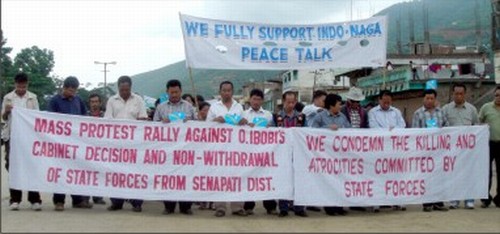Source: The Sangai Express
Imphal, July 14 2010:
Sharply retaliating to the resolution adopted by the Manipur State Legislative Assembly on July 9 that Manipur should be exempted from the purview of Article 3 of the Constitution of India after due amendments, which empowers the Centre to redraw the maps of any States, the United Naga Council has pointed to a clause on page 12 of Manipur Constitution when the British left in 1947 .
In a statement issued to the press today, the apex Naga organisation in Manipur said that when the British left in 1947, the hill leaders secured the incorporation of a clause on page 12 of the Constitution of the then independent Manipur, which read as '...right of any section of the Hill People to secede at the end of the five year period, should conditions within the Constitution be not satisfactory' .
|
Dubbing the private member resolution moved by Opposition leader Radhabinod Koijam in the Assembly seeking amendment of Article 3 of the Constitution of India as an intentional denial by the State Govt that the demand that all Nagas should live under one administrative unit is not the brain child of the NSCN (IM) alone, claimed UNC. Going back to the clause mentioned, UNC said that when the integrated Manipur Administration of the Hills and valley started functioning from August 15, 1947, the Nagas of Manipur launched the 'No House Tax Campaign' in 1948 to protest the high handed-ness of the Meitei people.
This happened when Maharaj Priyobarta was the Chief Minister, recalled UNC and added that under the Naga National League submitted their annual house tax to Charles Pawsey, DC of Naga Hills of Assam at Kohima in pursuit of their demand to be integrated under one administrative unit with their Naga brethren in Naga Hills under the then undivided Assam.
In pursuit of their demands, three Nagas were martyred at Mao Gate on August 27, 1948, said UNC.
Stating that the expression of the Naga people continued as a civil movement, UNC said that the United Integration Council movement of the 1970s and the agreement inked on August 4, 1972 between the All India Congress Committee and Manipur Pradesh Congress Committee on one side and the United Naga Integration Council on the other side is just one of the documented records that recognised the rights of the Nagas to live under administrative unit.
The question of Naga integration is also clearly mentioned in the 9 point Hydari Agreement of 1947 as well as in the 16 Point Agreement of 1960, recounted UNC.
Reacting to the observation of Radhabinod Koijam that uniting the Nagas under one administrative unit is untenable socially, geographically and culturally, UNC said that the Nagas have an apex body in the Naga Hoho whose jurisdiction runs over all Naga inhabited areas apart from the Naga Students' Federation.
The social essence of all Naga tribes lies in the village republics with clearly demarcated territories, said UNC and argued that this shows that Naga integration is socially tenable.
On the question of geography, UNC said that Nagas inhabit contiguous areas and because of the larger area and bigger population, an integrated Naga administration would be economically viable.
Culturally too, the unique diversity of the Nagas in Manipur has been recognised by the State Government in declaring Lui-Ngai-Ni as a State festival as well as a general holiday.
On the other hand, with only 10 pc of the valley making up the State of Manipur, it would be untenable for the existence of Manipur as a State, UNC said in retaliation to the observations of Radhabinod Koijam.
This is their main concern, it added.
UNC also questioned why the July 1, 2010 declaration of the Naga people to sever all ties with the State Government has not been tabled and discussed in the ongoing Assembly session.
Has the issue been sidelined because of the misconception that everything is done under the directives of the NSCN (IM), countered UNC and further questioned whether the decision of the Naga people to sever all ties with the Government of Manipur outside the purview of the State Government.
Why has the State Assembly not discussed whether the declaration of the Nagas is tenable or not, asked UNC.
All these show that the Government of Manipur is concerned only with the 10 pc geographical area of the valley.
On Article 3 of the Constitution of India, the UNC said that it is an acknowledgement that India is a multi-ethnic and multi-national entity and the identity and sense of belongingness among peoples should be respected.
The resolution to exempt Manipur from the purview of Article 3 is therefore unconstitutional, argued UNC adding that this only goes on to confirm that the State Government has consistently tried to legitimise the suppression of the tribals through legislation, Acts and resolutions.
The Assembly resolution of July 9, 2010 has vindicated the stand of the Naga people to sever all ties with the Government of Manipur, it added.






